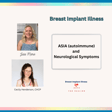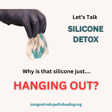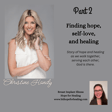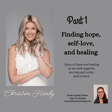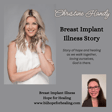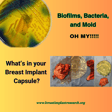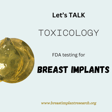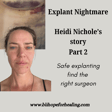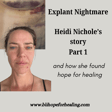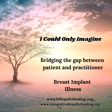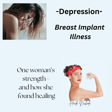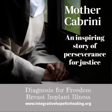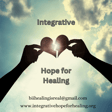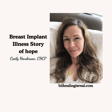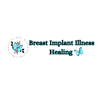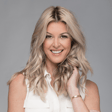Become a Creator today!Start creating today - Share your story with the world!
Start for free
00:00:00
00:00:01

What Happens to Children exposed in the WOMB?
DON'T miss this podcast as the brave Kit Caren talks about her story and what happened when she was exposed to breast implant chemicals in the womb. FOR FULL INTERVIEW: https://www.youtube.com/@breastimplantillnesshealing
Transcript
Introduction
00:00:03
Speaker
Welcome to Breast and Plant Illness Hope for Healing. This is Cecily Henderson, your host. Thank you for joining us today. This podcast, I have a very special guest.
Kit Karen's Experience
00:00:14
Speaker
Her journey is not the typical breast and plant illness story, and her bravery and advocacy has touched many people's hearts, including mine. She's never had breast implants, but she has been affected by breast and plant illness. Her name is Kit Karen, and a lot of people know her as Catherine Ann, and she has a very important message to share with us today. Welcome, Kit Karen. Thank you.
Concerns About Silicone Disease
00:00:44
Speaker
You said that your mother had breast implants, correct? My mother got double lumen breast implants in 1982.
00:00:52
Speaker
And the double lumen is both silicone and saline on the interior of the silicone shell. um So she got those in 1982. I was conceived in 1984, born in 1985. um They ah didn't really think anything was wrong with me in the beginning. um I did go to the doctor a lot. I had a lot of upper respiratory infections and a lot of UTIs and Um, unusual rashes. Um, my mom mo was concerned at one point because my foot was turning out. Um, but yeah, they didn't think anything was wrong until in 1991, I believe my mom heard about, um, everything going on with the breast implants. And at that time they were calling it silicone disease.
00:01:49
Speaker
Oh,
Research on Breastfeeding and Implants
00:01:50
Speaker
yeah. So she actually flew down to Tampa, Florida, where there was a rheumatologist who was specializing in the silicone disease. And um when she talked to him, she asked, you know, what about my children that I breastfed and I had? And he was like, you know, there's very little research done on the women and absolutely nothing done on the children. my mom talked to the FDA a lot and she would be like, you know, what's going on with these children? Can you do tests? Like, and she actually like talked to a woman who was doing tests on the women and she was like, you know, you should be happy that they're doing tests on the women. And they're like, you can't expect a test on the women to roll over to the children no because it's completely different because we're being formed.
00:02:47
Speaker
in the presence of these chemicals. If you go on the FDA website right now, it says like, you know, no silicone has been found in breast milk. And silicone and silicone are very different substances. Right. And it says that, you know, some mothers have um claimed that their children are sick. But when whenever you have a number of children getting sick, it needs to be studied, it needs to be warned about, and they're just not doing enough. No.
00:03:26
Speaker
They're not, I agree. that's why That's why I had to have you on the podcast so we can get this word out.
FDA Testimony and Tragedy
00:03:31
Speaker
yeah um Now, I know that your, so your mother had, didn't she testify before the Food and Drug Administration in 2000? Tell us a little bit about that. um and we testified Me and her went up and testified and I actually read a letter that I wrote to Oprah because I had seen um i had seen a doctor claiming that breastfeeding your children was safe on the show. And so I wrote Oprah and what I got back was a letter from the legal department. edge But yeah, so we went and we testified and then um we flew home. And then the next month we flew to Las Vegas to do another interview. And then we flew back home. And then the next month she killed herself.
00:04:23
Speaker
um And it's it's very hard to- I'm so sorry. Thank you. Thank you. It's it's really, it's difficult for me, most of all, because I have dealt with depression and suicidal ideation since I was 10, because I knew that my and i my life would never be what everybody else's was. and
00:04:55
Speaker
she would tell me time and time again that I could never commit suicide because it was wrong and that mom, dad would always take care of me. And so that's why it's very difficult for me to even imagine that she would take that drastic of a step. And she she was actually in contact with the FDA the month She killed herself. It hit my heart so hard when you told me that the just everything that was going on, you know, as far as your growth and and then you had these complications, you know, illnesses on top of that that you were dealing with. I mean, you are such a strong woman to go through all of that and then advocating. Just thank you for thank you for doing what you're doing. You are amazing woman.
00:05:50
Speaker
I am trying to, I'm trying to help the kids that are going through this now um because I want them to know that they're not alone. And yes, this, you know, this terrible thing has happened. And my mom, when she killed herself, she didn't even know, like she didn't have the evidence that we had after she died. Because after she died, her like organs and all of that was sent to a forensic toxicologist and they found platinum in her brain and her lungs and her heart. And. Oh my gosh. Yeah.
Health Impact of Platinum Exposure
00:06:29
Speaker
When I came back into the breast implant things, I did a five strands test to see how my body interacts with heavy metals. And platinum was one that my body does not get rid of.
00:06:43
Speaker
And so when I was 15, I had the amount of platinum in my body that someone who had worked um you know for years on highways or with the production of platinum. And I didn't have any of those exposures. And so ah my exposure was from my mother's breast implants because the platinum is used as a catalyst in the shell. Right. And so if that can get to the fetus, then any other number of chemicals and heavy metals that are used can get to the fetus as well.
00:07:19
Speaker
Yeah, that's that is 100% correct.
Critique of Testing Standards
00:07:22
Speaker
And i I know I just did a podcast on ah the toxicology, right? So that they do the FDA recommends toxicological testing on breast implants because of that the plata the platinum catalyst. Right. the And do you think surgeons do that? I i have never heard of any surgeon. I haven't either. Yeah, testing before they implant breast you know, do breast surgery. and But the FDA just kind of passes it off to the surgeon as their responsibility right so that they don't have, you know, have to take part in that, which is wrong. It's totally wrong. And it talks about these catalysts. It talks about ah reproductive. It talks about teratogenicity, which is yeah the reproduction of women. and
00:08:10
Speaker
and that they need to do testing on this. Why is nobody talking about this? I don't know. I don't know. It's unfortunate that every woman's story is not given enough credibility because my mom said this at the FDA hearing or like right after we were interviewed by CNN. She's like, how many women and children have to stand up? and say that this like makes us sick because we're not anecdotal evidence. There were 400,000 women in the Dal corning settlement in the nineties. Wow.
Health Diagnoses and Advocacy
00:08:56
Speaker
Karen, share with us a little bit about, you know, what your day to day life looks like and the illnesses that you have to deal with. Okay. So the illnesses that I that I currently deal with. So um it's interesting. When I was younger, ah so my neurological symptoms started when I was six. Gosh, that's so young. Five. It was just dizziness and clumsiness. And so my parents, yeah. They took me a to a neurologist and I wasn't diagnosed with TIDP until I was 13. They had no idea what was going on.
00:09:39
Speaker
which is the story with every breast implant person. and So I was diagnosed with CIDP when I was 13, but then when I was 27, that diagnosis changed to Freudrix ataxia. But we do not present like a lot of the other people with Freudrix ataxia. um And then when I was seven, I was diagnosed with um GERD and also esophageal motility disorder. And that was only because there was a group doing a study on the kids with the breast implants or it had mothers with the breast implants. And that's the only reason why they found it.
00:10:26
Speaker
um So these studies are very, very important. Yes. And they need to be done because a lot of times Parents don't realize that the stomach aches that their kids are dealing with or the rashes have anything to do with the implants. Yeah.
Broader Impact on Families
00:10:48
Speaker
It's so much bigger than we could ever imagine. Exactly. Because it doesn't just affect the woman. It affects the husband too that has to take care of the woman it to or the partner that has to take care of the woman.
00:11:01
Speaker
um And then the children that are is are either without a mom yeah because they're sick or they are affected because they were born yeah within the timeframe that the woman had breast implants. There's so much that's being affected. And and it's just by because we don't have the information out there and the information we do have out there is being ignored. Exactly.
Finding Hope and Support
00:11:26
Speaker
Now with all your advocacy, it you know all the things that you are doing, um how do you find hope every day through all of this? What is what is what is the light that you know is brought to your life? Honestly, the mothers are really the main reason and also the children um because
00:11:51
Speaker
i I want every mother out there that is going through these things with their children to know that they're not crazy. And, you know, they actually helped me a lot because, you know, there are just so many different things that these chemicals affect. And it's not like we're all the same because we're all, we're all different because of number one, like we're raised how, like what our actual genetics are because the chemicals mix with our genetics and our DNA and alters DNA. I, I try to live.
Daily Challenges and Conclusion
00:12:36
Speaker
I try not to limit, you know, because I'm, I'm going to die early anyway. Um,
00:12:45
Speaker
you know, with the free-shook sataxia and then, you know, everything that's going on with my body, like my bladder's pretty much like I feel like it's gone. You know, my legs don't work very well. um And it's interesting because although like I have a lot of numbness in my feet, it's also extremely sensitive. I i have to wear shoes in the shower. because I can't even put my feet on the ground because it just goes crazy. Oh my goodness. Karen, you are such an amazing woman and such a bright, bright spirit. I will have to have you on the podcast again. We can talk more about that because I i would love, I know that many people would love to hear more. yeah So thank you so much, kit Karen. Thank you for having me. You're you' are so welcome. It's an honor and it's been a joy.
00:13:42
Speaker
So I appreciate you. Oh, thank you. Thank you, Derek. For all of those that you're listening today, I just want to say thank you for joining us. And always remember, there is hope for healing.
